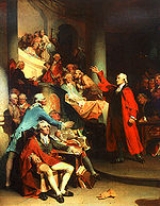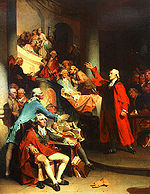
Virginia Resolves
Encyclopedia

Virginia General Assembly
The Virginia General Assembly is the legislative body of the Commonwealth of Virginia, and the oldest legislative body in the Western Hemisphere, established on July 30, 1619. The General Assembly is a bicameral body consisting of a lower house, the Virginia House of Delegates, with 100 members,...
in response to the Stamp Act of 1765
Stamp Act 1765
The Stamp Act 1765 was a direct tax imposed by the British Parliament specifically on the colonies of British America. The act required that many printed materials in the colonies be produced on stamped paper produced in London, carrying an embossed revenue stamp...
. The Stamp Act had been passed by the British Parliament to help pay off some of its debt from its various wars, including the French and Indian War
French and Indian War
The French and Indian War is the common American name for the war between Great Britain and France in North America from 1754 to 1763. In 1756, the war erupted into the world-wide conflict known as the Seven Years' War and thus came to be regarded as the North American theater of that war...
fought in part to protect the American colonies.
The resolves claimed that in accordance with long established British law, Virginia was subject to taxation only by a parliamentary assembly to which Virginians themselves elected representatives. Since no colonial representatives were elected to the Parliament
Parliament of the United Kingdom
The Parliament of the United Kingdom of Great Britain and Northern Ireland is the supreme legislative body in the United Kingdom, British Crown dependencies and British overseas territories, located in London...
the only assembly legally allowed to raise taxes would be the Virginia General Assembly
Virginia General Assembly
The Virginia General Assembly is the legislative body of the Commonwealth of Virginia, and the oldest legislative body in the Western Hemisphere, established on July 30, 1619. The General Assembly is a bicameral body consisting of a lower house, the Virginia House of Delegates, with 100 members,...
.
Origin
On May 29, 1765, Patrick HenryPatrick Henry
Patrick Henry was an orator and politician who led the movement for independence in Virginia in the 1770s. A Founding Father, he served as the first and sixth post-colonial Governor of Virginia from 1776 to 1779 and subsequently, from 1784 to 1786...
made one of his famous speeches before the Virginia House of Burgesses to encourage the passage of the resolutions. Henry said "Caesar had his Brutus, Charles I his Cromwell, and George III... (Henry was interrupted by cries from the opposition)… may profit by their example. If this be treason, make the most of it." (Some historians consider the last sentence to be a later fabrication). When Patrick Henry paused after the vibrant portion of the speech, Speaker John Robinson
John Robinson (Virginia)
John Robinson, Jr. was a politician and landowner in the British colony of Virginia. Robinson served as Speaker of the House of Burgesses from 1738 until his death, the longest tenure in the history of that office.-Career:...
stood and shouted, "Treason! Treason!". Patrick Henry at this point issued a semi-apology. Later Speaker Robinson declared, "twenty ayes and nineteen nays"...
Peyton Randolph
Peyton Randolph
Peyton Randolph was a planter and public official from the Colony of Virginia. He served as speaker of the Virginia House of Burgesses, chairman of the Virginia Conventions, and the first President of the Continental Congress.-Early life:Randolph was born in Tazewell Hall, Williamsburg, Virginia...
later told his young cousin Thomas Jefferson
Thomas Jefferson
Thomas Jefferson was the principal author of the United States Declaration of Independence and the Statute of Virginia for Religious Freedom , the third President of the United States and founder of the University of Virginia...
who was standing in the doorways of the House quite frequently. "By God, I would have given 500 guineas
Guinea (British coin)
The guinea is a coin that was minted in the Kingdom of England and later in the Kingdom of Great Britain and the United Kingdom between 1663 and 1813...
for a single vote".
Henry had waited for most of the more conservative members of the assembly to be away before submitting the resolves. The Burgesses generally voted along geographic lines with eastern Virginians opposing the resolves and central Virginians supporting them. Patrick Henry left Williamsburg, Virginia
Williamsburg, Virginia
Williamsburg is an independent city located on the Virginia Peninsula in the Hampton Roads metropolitan area of Virginia, USA. As of the 2010 Census, the city had an estimated population of 14,068. It is bordered by James City County and York County, and is an independent city...
that night fearing the powerful members of the House would harass him with a warrant.
The next day, with Patrick Henry gone and most conservative assembly members back in session, the assembly again set a vote with conservatives trying to have the Resolves struck from the record. However Henry's supporters managed to preserve the first four resolutions with only the more radical 5th Resolution being struck.
In late June the Newport Mercury was the first newspaper to publish the Virginia Resolves to the general public with several other newspapers following soon after. Notably none of the newspapers drew on the official House records and as a result the published resolutions included not only the 4 ratified resolutions but also the, already removed, 5th resolution. In fact the newspapers even went so far to include a 6th and 7th resolution the origin of which is still disputed. Some sources quote those two articles as being part of Henry's original manuscript while others argue that their origin is completely unknown.
A direct result of the publishing of the Virginia Resolves was a growing public anger over the Stamp Act and according to several contemporary sources the Resolves were responsible for inciting the Stamp Act Riots. Governor Thomas Hutchinson of Massachusetts stated that "Nothing extravagant appeared in the papers till an account was received of the Virginia Resolves." Later Edmund Burke
Edmund Burke
Edmund Burke PC was an Irish statesman, author, orator, political theorist and philosopher who, after moving to England, served for many years in the House of Commons of Great Britain as a member of the Whig party....
linked the resolves with the beginning of the opposition to the Stamp Act that would contribute to the American Revolution
American Revolution
The American Revolution was the political upheaval during the last half of the 18th century in which thirteen colonies in North America joined together to break free from the British Empire, combining to become the United States of America...
.
Text of the Virginia Resolves
The original text of the Virginia Resolves as adopted by the House of BurgessesHouse of Burgesses
The House of Burgesses was the first assembly of elected representatives of English colonists in North America. The House was established by the Virginia Company, who created the body as part of an effort to encourage English craftsmen to settle in North America...
on May 29, 1765 was as follows:
1. Resolved, that the first adventurers and settlers of His Majesty's colony and dominion of Virginia
Virginia
The Commonwealth of Virginia , is a U.S. state on the Atlantic Coast of the Southern United States. Virginia is nicknamed the "Old Dominion" and sometimes the "Mother of Presidents" after the eight U.S. presidents born there...
brought with them and transmitted to their posterity, and all other His Majesty's subjects since inhabiting in this His Majesty's said colony, all the liberties, privileges, franchises, and immunities that have at any time been held, enjoyed, and possessed by the people of Great Britain
Great Britain
Great Britain or Britain is an island situated to the northwest of Continental Europe. It is the ninth largest island in the world, and the largest European island, as well as the largest of the British Isles...
.
2. Resolved, that by two royal charters, granted by King James I, the colonists aforesaid are declared entitled to all liberties, privileges, and immunities of denizens and natural subjects to all intents and purposes as if they had been abiding and born within the Realm of England
England
England is a country that is part of the United Kingdom. It shares land borders with Scotland to the north and Wales to the west; the Irish Sea is to the north west, the Celtic Sea to the south west, with the North Sea to the east and the English Channel to the south separating it from continental...
.
3. Resolved, that the taxation of the people by themselves, or by persons chosen by themselves to represent them, who can only know what taxes the people are able to bear, or the easiest method of raising them, and must themselves be affected by every tax laid on the people, is the only security against a burdensome taxation, and the distinguishing characteristic of British freedom, without which the ancient constitution cannot exist.
4. Resolved, that His Majesty's liege people of this his most ancient and loyal colony have without interruption enjoyed the inestimable right of being governed by such laws, respecting their internal policy and taxation, as are derived from their own consent, with the approbation of their sovereign, or his substitute; and that the same has never been forfeited or yielded up, but has been constantly recognized by the kings and people of Great Britain
Great Britain
Great Britain or Britain is an island situated to the northwest of Continental Europe. It is the ninth largest island in the world, and the largest European island, as well as the largest of the British Isles...
.
5. Resolved, therefor that the General Assembly of this Colony have the only and exclusive Right and Power to lay Taxes and Impositions upon the inhabitants of this Colony and that every Attempt to vest such Power in any person or persons whatsoever other than the General Assembly aforesaid has a manifest Tendency to destroy British as well as American Freedom.
This 5th resolution was originally adopted along with the other 4 on May 29, but struck the next day in a separate vote by the assembly.
Additional resolutions
When the Virginia Resolves were first published in colonial newspapers the articles cited not only the officially adopted 4 resolutions but included the, already revoked, 5th resolution along with two more resolution the origin of which is still disputed. Those additional resolution were:6. Resolved, That his majesty's liege people, the inhabitants of this colony, are not bound to yield obedience to any law or ordinance whatsoever designed to impose any taxation whatsoever upon them, other than the laws and ordinances of the general assembly aforesaid.
7. Resolved, That any person who shall by speaking or writing maintain that any person or persons other than the general assembly of this colony have any right or power to impose or lay any taxation whatsoever on the people here shall be deemed an enemy to this his majesty's colony.
These two resolutions were never passed by the House of Burgesses and it is not known who authored them although some sources claim that they were part of the original draft by Patrick Henry.

